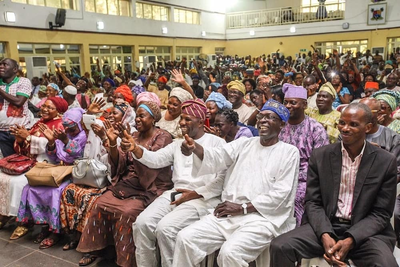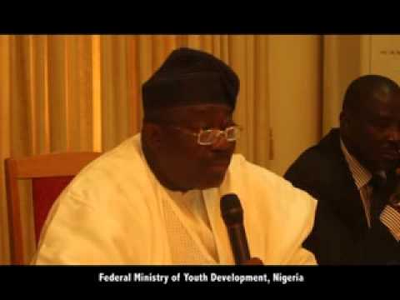The Nigerian Politics of Tribalism By Ayodele Osho
I found this article on the Nigerian Politics of Tribalism and wish to share it with my readers.
The politics of tribalism in Nigeria has contributed to its enduring fragile democracy. The article explains the basis and origin of the phenomenon and offers some advice on ways forward.
———————-
This is an entry for the Pulse writer’s contest by Ayodele Osho. “…No nation can record progress if her people are suspicious of one another based on ethnocentric sentiments and historical resentment…”
According to the 8th Edition of the Oxford Advanced Learner’s Dictionary, Tribalism is the behaviour and attitudes that stem from strong loyalty to one’s own tribe or social group. Tribalism suggests the possession of a strong ethnic identity that distinguishes one member of a tribe from the members of another tribe. We can decide to let this hold us back or use the rich diversity in Nigeria to our benefits.
Nigeria, being a multi-ethnic society has been faced with tribalism over the years. Each ethnic group has its own culture, language and traditional belief. There are numerous negative perceptions about the various tribes even by Nigerians. The various tribes in Nigeria have their mythologies about where they originated from. The diversities from the origin however ought to be a blessing to the Nigerian nation. However, its heterogeneous nature has been the bane of the nation at various times in her over hundred years of existence.
The first step for Nigeria to really succeed in the 21st century is to put an end to tribalism and look forward to attaining true nationhood. No nation can record progress if her people are suspicious of one another based on ethnocentric sentiments and historical resentment.
There is NO point in being tribalistic in this era of political and economic transformation. Some people from some tribes may have been seen in the past as the cause of the problems in Nigeria. However the time is right to put our Nigeria in the comity of nations that have outgrown sentiments and become united irrespective of all odds.
The inter-ethnic relationship among the various tribes in Nigeria has been severed with power tussle and ethno-religious crisis among ethnic nationalities leading to marginalization and loss of lives and property.
Tribalism is very much related to racism. Tribalism is at the very core of the nation’s politics and it will be a hindrance as long as it is allowed to continue. It is not the sole cause but of course it adds to the some of the social and political difficulties that Nigeria is facing today.
The fundamental solution to the issue of tribalism is to love one another equally. We as a people must shun defamation of character in any form. The leadership of the nation should not base political appointments on tribe. We need to remember that we are all humans, and all have the same wants.
Nigerian politics is very complicated but, it is not entirely different from world politics, which is often plagued by partisanship and sectionalism. Nigerian politics is unique however, because it brings into play so many factors, a few of which includes individual interests, geographic factors, ethnicity, religion and a host of other issues. Politics is an integral part of democracy, and in order for us to achieve sustainable development, we need to redefine politics in Nigeria. Up till this moment, true democracy has remained elusive to us, and we must do something about it.
Recent political developments in Nigeria have unearthed the true depth of the underlying spirit of her nationhood. It has also put to a simple test, the character of our political leaders; who are supposed to be advocates of change. But as it is now, the parochial interests of the nation’s political, tribal, and religious leaders have made nonsense of the character of sound political leadership as prescribed in every healthy presidential democracy. It is most absurd to note that the political class has shamelessly turned Nigeria’s democracy on its head. This sad development is a clear demonstration that the noble democratic culture of good governance has been deliberately drowned in the pool of negative political scheming.
Institutional framework has become too weak and consequently unable to carry the burden of Due Process and the Rule of Law. While Transparency and Accountability are products of the culture of Due Process, the Rule of Law promotes Justice and Fair Play. These principles are unarguably the pillars of any healthy society.
This explains why Nigeria is still counted among the poorest nations of the world despite her abundant human and natural resources. It has also given a clue as to why Nigeria – the sixth largest producer of crude oil in the world relies on the importation of virtually all petroleum products. Instead of this sad reality posing a huge challenge to our political leaders; they have with selfish intentions allowed the nation to drift far into the ocean of anarchy and disintegration. Surprisingly, the political class is carrying on as if Nigeria has nothing to lose, even when the contrary is clearly the case.
Nigeria’s greatest problem is tribalism. It is owing to the deep rooted culture of tribalism that successive administrations have not been able to effectively fight corruption in Nigeria. There is an unwritten law in Nigeria that forbids citizens from exposing or prosecuting fellow tribesmen for corrupt practices.
That is the reason why public servants that earn less than N5Million annually will build mansions and own fleet of exotic cars worth over N500m and still be conferred with chieftaincy titles without verifying the sources of the sudden wealth of their kinsmen and women.
Nigeria has been turned into a nation where one must also have his or her tribes person in position of authority in order to be employed, given a key appointment, or awarded a big contract. This anomaly is hugely responsible for why the issue of tribal lineage is regarded far above every other factor in the Nigerian society. In a nutshell; tribalism can only become rife in a nation where there is no transparency, accountability, justice, and fair play.
Furthermore, tribalism promotes national poverty. It compels citizens to be lazy. In a tribal-induced bureaucracy, even people that sow nothing can reap bountifully simply because their tribes person is in power. This is clearly against natural principle. The more we promote tribal agenda above constitutional provisions, the closer we move toward disintegration. Everybody professes “One Nigeria” but is unwilling to make the necessary sacrifices to unite the various ethnic clusters in the nation.
Power belongs to God. He gives power to whoever that pleases Him. God also takes away power whenever it pleases Him. One is therefore forced to wonder why people see and treat power with a “do-or-die” attitude. Perhaps, one should emphasize here that the basic aim of political power is to improve the lives of man and society through quality leadership.
Nigeria is bigger than any individual or ethnic group. It is high time Nigeria became a nation; it is about time we have a shared culture and our national values restored.
Courtesy Pulse NG. Read More on this article and others from Pulse NG Magazine


